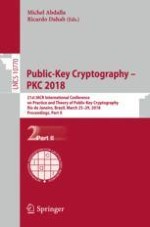2018 | OriginalPaper | Buchkapitel
Making Public Key Functional Encryption Function Private, Distributively
verfasst von : Xiong Fan, Qiang Tang
Erschienen in: Public-Key Cryptography – PKC 2018
Aktivieren Sie unsere intelligente Suche, um passende Fachinhalte oder Patente zu finden.
Wählen Sie Textabschnitte aus um mit Künstlicher Intelligenz passenden Patente zu finden. powered by
Markieren Sie Textabschnitte, um KI-gestützt weitere passende Inhalte zu finden. powered by
